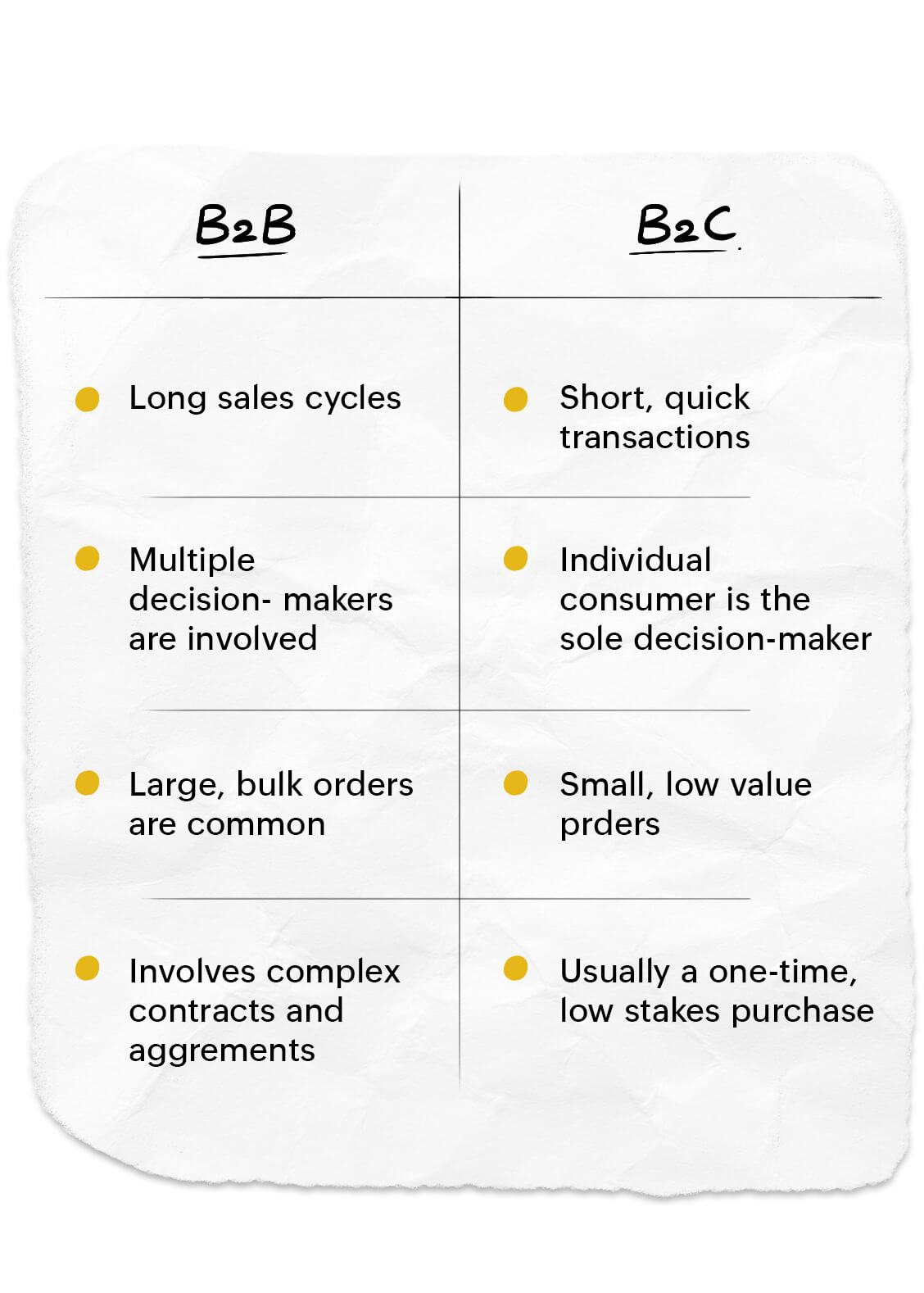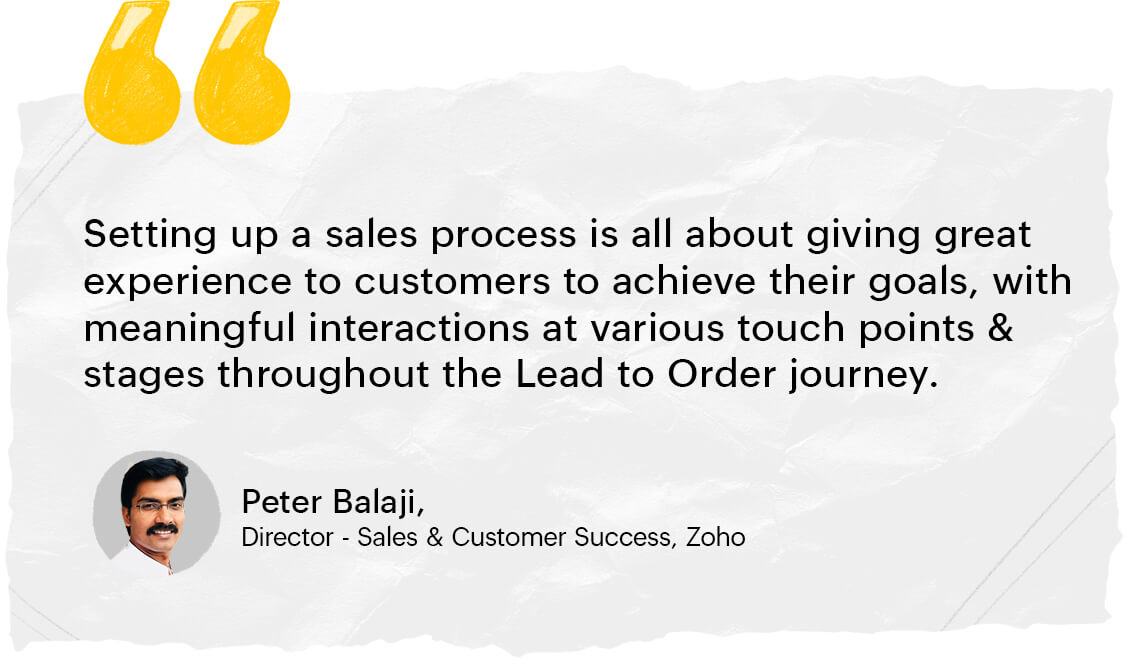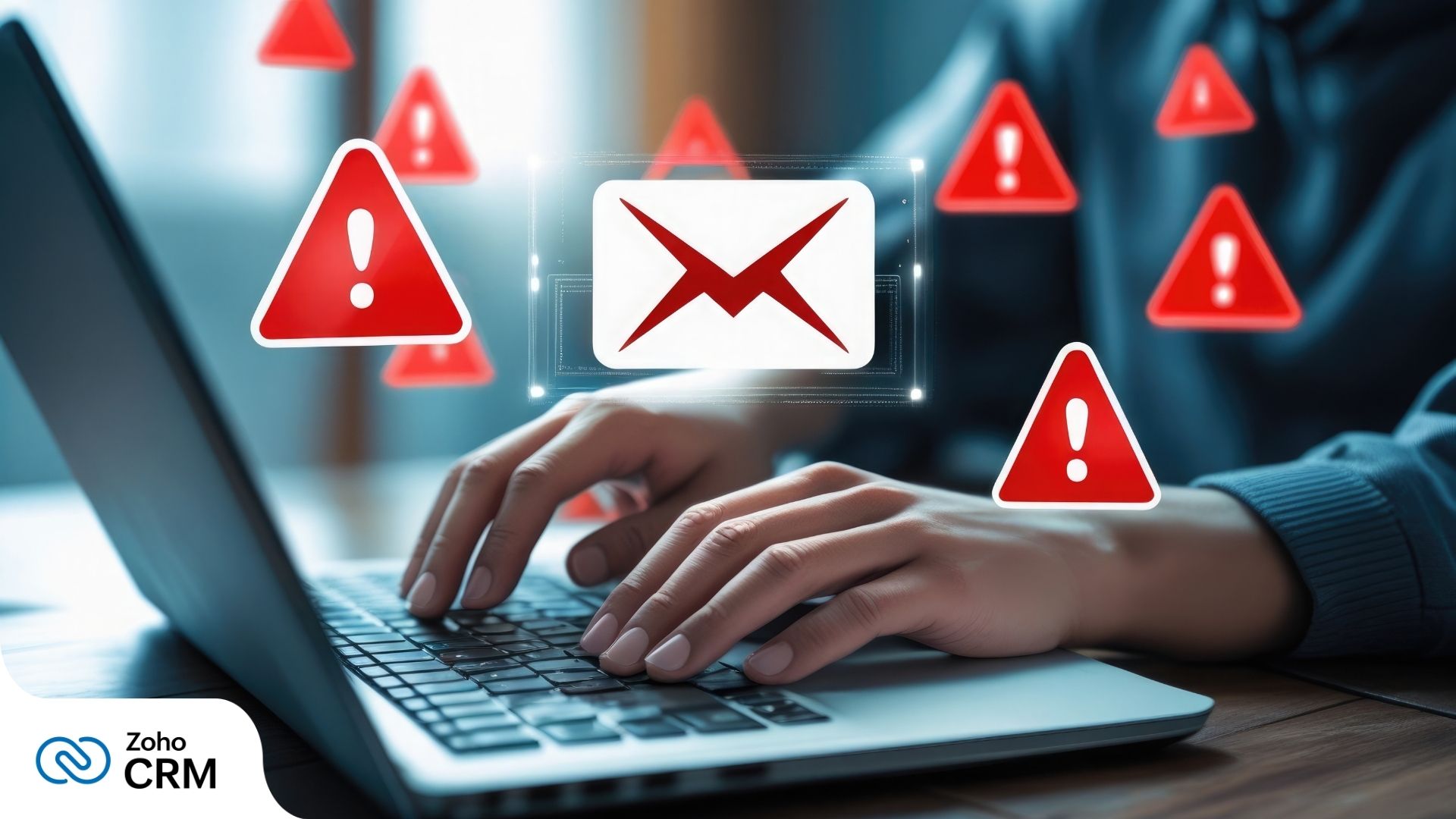Essentials of B2B sales: Understanding & Building a Strategy
- Last Updated : July 3, 2024
- 2.1K Views
- 9 Min Read

Business-to-business (B2B) companies are those that conduct transactions with other businesses rather than with individual consumers. These transactions can involve just about anything: goods and services, raw materials, manufacturing equipment, labor and services, and, in Zoho's case, software solutions. Zoho CRM has been in the business of helping businesses for three decades. It's as B2B as businesses get.
Today's B2B buyers are unique; they're intelligent, value-driven, and seek personalized experiences–more so than consumers in business-to-consumer (B2C) markets. To improve or even define your B2B sales strategy, you first need to understand it.
In this article, we'll examine the meaning of B2B sales, what its characteristics are, and how solutions like Zoho CRM can enhance your B2B sales strategies. You can be a total novice or a juggernaut - this article is for anyone in sales looking to learn more.
Table of Contents
- What is B2B?
- Key Characteristics of B2B
- How are today's B2B buyers different?
- The B2B Sales Process
- Let's build a B2B Sales Strategy
- Choose the right B2B sales strategy. Choose the right CRM.
What is B2B?
As we've said, B2B refers to commerce conducted between businesses.
Imagine going to a farmer's market. As a restaurant owner, the business you'd do there is B2B; you'd buy ingredients in bulk, plan ahead, negotiate terms, and build long-term relationships with farmers to ensure consistent quality and supply. Several parties would be involved in making the decisions in this process. But if you just go to buy goods for yourself, you're buying for immediate use—an evening dinner, perhaps. You'd act quickly based only on your own preferences, and you'd be the only stakeholder involved in the decisions (unless, of course, you bring your children with you). That's B2C.
Your business may potentially serve both B2B and B2C markets, and creating successful sales strategies requires awareness of their distinctive features, because B2B and B2C spaces are a lot more different than you may think.
Further Reading:Why Traditional B2B Sales Methods Are No Longer Enough
Key Characteristics of B2B

Long sales cycles
B2B sales often require significant amounts of time for research, negotiations, and approvals, resulting in longer sales cycles. This extended process is crucial for building trust, demonstrating value, and meeting the complex needs of businesses. On average, B2B sales cycles exceed six months, according to CSO Insights.
Multiple decision-makers
Decisions in B2B sales typically involve several stakeholders, such as managers, procurement officers, and financial analysts. Gartner reports that the average B2B buying group consists of six to ten decision-makers, which means sales teams must effectively engage and communicate with all parties to reach a consensus.
Large orders
B2B transactions typically involve bulk purchases as opposed to small, one-off purchases. Businesses tend to buy in large quantities to proactively meet their dynamic demands and to get fair prices. Between trials, samples and prototypes, and demos, this order is subject to change at will. Therefore, bulk orders require careful planning and coordination to meet business clients' specific needs.
Complex contracts
Large businesses deal in sales agreements: detailed contracts, service level agreements (SLAs), and long-term commitments. You must clearly outline the terms, conditions, and expectations of the deal to ensure mutual understanding and compliance. You may have to outsource this to third parties if you don't have the ability to get it done in-house.
Relationship focus
Successful B2B sales rely heavily on building and maintaining strong relationships with vendors and clients. Businesses prefer partners who consistently meet their needs, so they'll evaluate you as a whole—not just the product or service you offer. You need to be in it for the long haul, because they likely are.
How are today's B2B buyers different?
B2B sales have changed dramatically over the years. Advances in technology, shifts in buyer behavior, and the rise of data-driven strategies have reshaped how businesses approach sales. Let's dive into some of the key changes:
Digital transformation
The digital revolution has fundamentally altered B2B sales. Businesses now leverage technology to streamline processes, reach new markets, and enhance customer engagement. We're talking about CRMs, of course. The global CRM market was valued at USD 43.7 billion in 2020, with expectations to grow at a brisk rate over the course of next few years. It's evident that companies are investing heavily in CRM systems and e-commerce platforms to automate sales processes and provide seamless purchasing experiences.
Shift to Data-Driven Sales
Data analytics and AI are now integral to B2B sales strategies, enabling companies to make informed decisions, personalize interactions, and predict customer needs. Companies using advanced analytics in their sales processes see a 15-20% improvement in sales ROI. This allow businesses to gain deeper insights into customer behavior, optimize sales funnels, and drive more effective marketing campaigns.
Changes in Buyer Behavior
Modern B2B buyers are more informed and self-sufficient, often completing a significant significant portion of their purchase journey before engaging with a sales representative. In fact, 68% of B2B buyers prefer to research independently online before making a purchase decision. Content marketing remains the king, as always. Businesses must adapt to the changing behavior of buyers by providing valuable content, improving their online presence, and facilitating a clean self-service experience.
Emphasis on Personalization and CX
Personalization and a focus on customer experience are now critical components of B2B sales strategies, driving customer loyalty and satisfaction. It is no wonder that 80% of consumers are more likely to do business with a company that offers personalized experiences. Personalization in B2B sales can lead to increased customer engagement, higher conversion rates, and stronger long-term relationships.
Integration of Omnichannel Strategies
B2B sales increasingly adopt omnichannel approaches, combining online and offline channels to create cohesive and flexible buying experiences. One study shows that B2B buyers who use multiple channels have a higher lifetime value than those who use single channels. Therefore, an effective omnichannel strategy ensures that buyers can seamlessly transition between different channels, improving their overall experience and increasing the likelihood of purchase.
The B2B Sales Process
Navigating the B2B sales process involves several critical stages, each requiring careful attention and strategic thinking. Every business is unique, so there's no definitive framework for B2B sales. Typically, we incorporate the aforementioned characteristics to construct a process. For example, a typical sales process for may look like this:

Step 1: Finding leads The process starts with lead generation, which employs outbound tactics like cold calling and email campaigns, in addition to inbound tactics, like content marketing, SEO, and social media. You're probably already doing this in some way. | Step 2: Making connections In prospecting, we qualify leads to determine if they're a good fit for our company. This stage usually involves researching prospects to understand their business challenges and industry trends, breaking the ice, and bridging the gap during conversations. |
Step 3: Evaluation and analysis Salespeople interact with potential customers to identify their unique needs and problems. Being a good listener is crucial since it enables you to develop customized solutions for the client's particular problems. | Step 4: Proposal and presentation Crafting a compelling proposal and presentation comes next. You need to explain how your product or service can solve the client's problems. Clients often review multiple pieces of content before deciding. In fact, this blog currently serves that very purpose. |
Step 5: Negotiation Negotiation involves discussing terms, pricing, and conditions to reach a mutually beneficial agreement. This phase can be lengthy and involve multiple decision-makers. Effective negotiation skills are essential to navigate different interests and priorities. | Step 6: Seal the deal We have to complete our contracts and obtain our purchase orders on time. Even minor disagreements can endanger the deal, so a seamless closing procedure is crucial. It's no wonder that companies that make the buying process easy are 62% more likely to win high-quality sales. |
Step 7: Post-sale support Post-sale support is vital for maintaining client satisfaction and fostering long-term relationships. Excellent support ensures clients are happy with their purchases, which in turn increases the chances of repeat business and customer retention. | Step 8: Further business The success rate of selling to a customer you already know is 60 to 70%. To a new customer? Five to 20%. If businesses praise and recommend you, you're likely to become a household name in the community. That's why affiliate marketing, cross-selling and upselling, and loyalty programs are popular in the B2B space. |
Further Reading:The seven stages of a sales cycle and how to build and improve your own

Let's build a B2B Sales Strategy
As we mentioned, there's no one-size-fits-all B2B sales process since every business is utterly unique. Developing a successful B2B sales strategy involves several critical steps: discovering market opportunities, defining your approach, and building a robust sales process. However, Zoho CRM offers solutions for businesses of all shapes and sizes. If you're unsure about building a B2B sales framework from scratch, we advise starting off with Zoho CRM's offering.
Here's how Zoho CRM can assist you in discovering, defining, and building your strategy.
Discover
Market insights and lead generation
For starters, Zoho CRM's sophisticated data analytics and lead creation capabilities assist you in identifying prospective market opportunities and high-value leads. By integrating data from multiple sources and using predictive intelligence, Zoho CRM finds patterns and trends in your target market, which is the cornerstone of any sales process. It helps you understand where to focus your sales efforts.
Lead scoring and qualification
Zoho CRM's lead scoring is handy for ranking leads and assessing how likely they are to convert. Assigning scores involves evaluating numerous factors, including industry relevance, company size, and participation level. This helps you manage resources more effectively and increase the likelihood of successful conversions by concentrating on profiles and personas that are more likely to do business with you.
Define
Sales process customization
Every company has different sales strategies and goals, and Zoho CRM provides a wide range of customization options to help you specify and optimize the software as you see fit. You can create custom workflows, modules, and fields that serve your specific business or industry and help your teams engage with the new B2B sales system. At Zoho CRM, we believe that CRMs should adapt to the business, and not the other way around.
Setting sales goals and KPIs
Ont op of that, you can use Zoho CRM to create precise sales targets and key performance indicators (KPIs). You can monitor progress toward these objectives in real time with the help of our comprehensive reporting and analytics tools. These insights enable you to modify plans and tactics on the fly and stay on course.
Customer segmentation
Defining your market segments is crucial for a targeted sales strategy. Zoho CRM enables you to segment your customers based on various attributes, such as industry, geographic location, and buying behavior. This segmentation helps in tailoring your sales pitches and marketing efforts to different customer groups to increase their effectiveness.
Build
Pipeline management
Building an efficient sales pipeline is critical for managing prospects and deals. You can use Zoho CRM to categorize your clients according to several factors, including buying habits, industry, and region. By adjusting your sales pitches and marketing campaigns to suit various consumer segments, you can greatly improve the efficacy of your team's efforts.
Automation and efficiency
Zoho CRM comes with powerful automation features to streamline mundane and routine tasks such as follow-up emails, task assignments, data entry, and more. By automating these repetitive tasks, your customer teams can focus on building relationships with customers and improving overall productivity and efficiency.
Customized interface
Canvas for Zoho CRM is the industry's first built-in design studio created to help customers redesign the look and feel of Zoho CRM. Using the intuitive drag-and-drop builder, you can create interfaces that are simple, contextual, and practical to work with. This helps increase adoption and usage among users, which increases the overall value derived from the investment.
Integrations with third-party apps
Zoho CRM integrates seamlessly with over 1,000 third-party extensions, such as email marketing platforms, accounting software, and customer support systems. These integrations ensure a cohesive workflow across different departments, enhance collaboration, and provide a unified view of customer interactions.
Further Reading: Personalised sales: Five steps to earn customers for life
Choose the right B2B sales strategy. Choose the right CRM.
It comes down to two choices: If you're a medium- or large-sized business venturing into B2B sales for the first time, choose Zoho CRM. Our sales force automation suite, expansive marketplace, and powerful developer platform can help you build a well-oiled B2B sales process. If you're a micro or small business, choose Bigin by Zoho CRM, our starter-pack CRM for business looking to grow out of spreadsheets and emails. Either way, we've built the right solutions to assist you in discovering and mastering your B2B sales strategy, all in one place.
Our business relies on your success and worth. Whether you're a solopreneur, a family-owned business or a large enterprise, Zoho CRM offers the flexibility and functionality to support your business and deliver success. Zoho CRM is the world's favorite CRMs, trusted by over 250,000 businesses worldwide.


